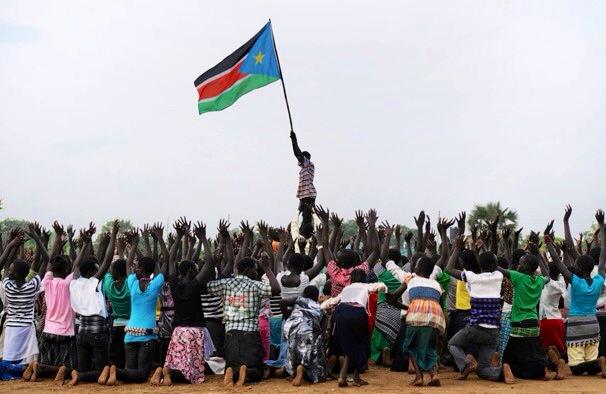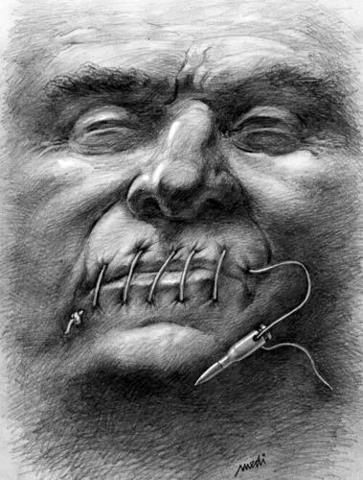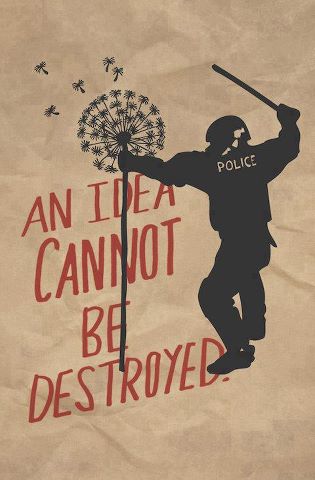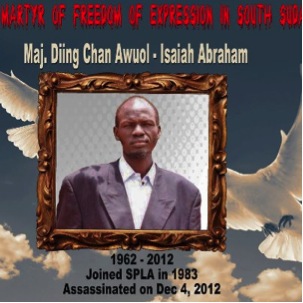“Let’s build the nation as a tribute to the heroes. The heroes did not die in vain. Though we cannot reward them materially, building this nation is a befitting tribute to them”,—South Sudanese President Salva Kiir Mayaardit.
By PaanLuel Wel, Washington DC, USA
The Martyrs’ Day: Who are the South Sudanese’s National Heroes and Heroines?
![“Wounded veterans of the southern Sudan People's Liberation Army march” [AP/Pete Muller].](http://www.southsudannewsagency.com/images/stories/AP's%20Photo.jpg)
“Wounded veterans of the southern Sudan People’s Liberation Army march” [AP/Pete Muller].
“Let’s build the nation as a tribute to the heroes. The heroes did not die in vain. Though we cannot reward them materially, building this nation is a befitting tribute to them”,—South Sudanese President Salva Kiir Mayaardit.
By PaanLuel Wel, Washington DC, USA
July 31, 2011 (SSNA) — Today, July 30th,2011, marked the first-ever “Martyrs’ Day” for the new Republic of South Sudan, just three weeks after declaring her independence from the Old Sudan. Martyrs’ Day is the day to commemorate and to “celebrate the selfless sacrifices of the heroes and heroines of liberation who paid the ultimate price for the liberation of the [new] country.” In Juba and other major cities across the country, as well as amongst the South Sudanese communities in the Diaspora, “people will light candles in the [living] memory of the martyrs” to pay “tribute to the people who lost their lives fighting for the independence which the country officially won this month.”
As reported on the official website of the government of the Republic of South Sudan, “the celebration is a demonstration of the fact that even though the martyrs are dead their memory lingers on in the hearts of all South Sudanese who appreciate the sacrifice they made for their homeland.” In short, South Sudanese Martyrs’ Day, just as it is normally the norm all over the world, is a day to remember and to immortalize the self-sacrificial patriotism of the martyrs: a befitting “tribute to the heroes and heroines of the liberation struggle.”
But who are the South Sudan heroes and heroines of the long liberation struggle? As an independent nation gearing up for political and socio-economical development, South Sudan would sooner than later be compelled to write official school textbooks for her school-going children to study in schools across the country. Inevitably, South Sudanese leaders and their socio-political constituents will have to sit down and grapple with the dilemma of deciding who the heroes and heroines are or are not.
Determining who the would-be national heroes and heroines for school textbooks would, undoubtedly, be problematic and controversial than anything South Sudanese have seen or been subjected to for a while. This is because our long war of liberation, from 1955 to 2011, was embroiled in numerous brotherly antagonisms among our own-selves more than, or in addition to, fighting the main common enemy that was recurrently oppressing us in all aspects of life. Since logic dictate that not everyone can be a hero or heroine lest the meaning is diluted, South Sudanese are consequently heading for one-yet biggest fight of their lives as picking the national heroes for educational purpose beckon, possibly this year or the next one.
With the right to withholding my views on this issue being fully exercised by me at this moment, I am going to name some names and why I presupposed them to be potential candidates for the national heroes and heroines’ list depending on the indispensable roles they variously played or continue to play in the war of liberation and national development of the Republic of South Sudan.
To start with, the first candidature goes to the brave warriors and leaders of the different South Sudanese communities and tribes who resisted and strove to repel, successfully or not, European colonization of their ancestral lands. By these communal resistances to the British rule, I am talking of the Nuer, the Zande and the Aliab Dinka, to mention but just a few. These communities are among the very few South Sudanese tribes that successfully fended off colonial powers in the early 20th century. In order to recognize and to pay tribute to their patriotism to our motherland and the ultimate price they tragically paid for their resistance, their leaders must be considered for school textbook and national archives for the national heroes and heroines of South Sudan.
The second groups are the South Sudanese representatives to the 1947 Juba conference that sealed the fate of South Sudan in the United Sudan that later miserably failed to be a workable political system. Because many of them were under-educated or had relied too much on the British for their national welfare, these South Sudanese were cheated and out-foxed out of their better choice of two state solutions. However, they did represent South Sudanese and therefore demand recognition at the national level. By these leaders I mean people like: Kamyangi Ababa, Sgt. Major Philomon Majok, Clement Mboro, Hassan Fertak, James Tambura, Chief Cir Rehan, Chief Gir Kiro, Pastor Anderea Apaya, Chief Ukuma Bazin, Edward Adhok, Buth Diu, Chief Lolik Lado, Chief Lappanya, Father Guido Akou, Ciricio Iro, Chief Tete, and Chief Lueth Ajak etc.
The third groups for the candidature for South Sudanese national heroes and heroines goes to the veterans of the 1955 Torit Uprising. Courageous veterans of the Torit Uprising such as General Emilio Tafeng and Ali Gbattala, among others, deserve a place in the hall of fame of South Sudanese national heroes. They were the first to fire a historic shot at the enemy, which heralded and culminated in the 2011 South Sudanese independence, notwithstanding the long period of time it took to materialize.
The fourth class of candidacy goes to the Anya-Nya One groups. It is to be recalled that Anya-Nya One was wrecked by perennial internal dissents and rebellions from the outset and it is therefore proper to class their leadership according to each governmental stage of the succession. The first government was the South Sudan Provisional Government (SSPG) headed by Aggrey Jaden as the president. The leading members of the SSPG were as follow: Agrey Jaden, Camilo Dhol Kuaac, Akuot Atem Mayen, Gordon Muortat Mayen, Elia Lupe, Clement Moses, Balieth Kuak, Gabriel Kaau Ater, General Emilio Tafeng, Ali Gbattala, Joseph Lagu Yanga, Paul Awel, Emanuel Abuur Nhial and Frederick Brian Maggot, among others.
After the collapse of the SSPG due to internal political wrangling, the second Anya-Nya One government, the Nile Provisional Government (NPG), was formed with Gordon Muortat Mayen as the president. The main leaders under him were: Marko Rume, David Kwak, Bari Wanji, Camilo Dhol Kuaac, General Emilio Tafeng, Ali Gbattala, Joseph Lagu Yanga, Frederick Brian Maggot, Paul Awel and Emanuel Abuur Nhial. Unfortunately, the illness of the SSPG caught up with the NPG and it too disintegrated as soon as it was formed and launched due to political squabbling over leadership.
In the wake of the demise of the NPG, General Joseph Lagu Yanga, with the solid backing of the Israelis, reconstituted the remnants of the SSPG and NPG under his new political movement: South Sudan Liberation Movement (SSLM) with Anya-Nya Forces as its military wing. Besides General Lagu, the other prominent leaders of the SSLM were: Frederick Brian Maggot, Joseph Akuon, Habbakuk Soro, Joseph Oduho, Emmanuel Abuur Nhial, Enoch Mading de Garang and with Father Saturnino Lohure acting as their spiritual leader.
In the event and time that South Sudanese would sit down to deliberate the final list for the national heroes in the national archive, the leaders of the Anya-Nya One Movement—the South Sudan Provisional Government of Aggrey Jaden, the Nile Provisional Government of Gordon Muortat Mayen and the South Sudan Liberation Movement of General Joseph Lagu Yanga—must all be considered for the award of the national heroes because they are part and parcel of our armed and political struggle.
The fifth group of candidates for the national heroes and heroines goes to presidents and various leaders of the successive government of the High Executive Council (HEC) in Juba after the signing of the Addis Ababa Agreement and before the outbreak of the SPLM/A war in 1983. There were three presidents, at various times, of the HEC: Abel Alier Kwai, Joseph James Tombura, and Joseph Lagu Yanga under whose leadership, and upon whose insistence, kokora was decreed and implemented by President Jaafar Nimeiri.
Other leading members of, or MPs under, the High Executive Council were: Clement Mboro, Bona Malwal, Joseph Oduho, Hilary Paul Logali, Peter Gatkuoth Gwal, Samuel Aru Bol, Ezboni Mundiri, Eliaba James Surur, Dr. Lawrence Wol Wol, Daniel Kuot Mathews, Benjamin Bol Akok, Samuel Gai Tut, Akuot Atem Mayen, Dhol Acuil Aleu, Mathew Obur, Elijah Malok Aleng, Michael Wal Duany, Natale Olwak Okalawin, Venansio Loro, Philip Obang, Abdel Latif Chaul Lom, Zakariah Wani Yugusuk, Archbishop Paulino Lokudu, Andrew Wiew Riaak, Martin Majier Ghai, Toby Maduot, Malath Joseph Lueth, Kawac Makwei, Brigadier Andrew Makur Thaou, Brigadier Joseph Kuol Amuom, Colonel Habbakuk Soro, Colonel Alison Manani Magaya, Colonel Saturnino Arika, Colonel John Kaong Nyuon, Colonel Peter Mabil, Colonel Alfred Deng Aluk, and Major General Samuel Mabor Malek.
The sixth groups for the award are the members of the Underground Movement/Resistance or the Clandestine Group/Resistance formed by, among others, the former members of the Anya-Nya One who were either opposed to the Addis Ababa Agreement or were suspicious of the Nimeiri government intention and had gone underground to protect South Sudanese interest. In case the agreement is rescinded, they were ready and willing to resume the war. Among these were ex-Anya-Nya members such as Emmanuel Abuur Nhial, Alfred Deng Aluk, Alison Manani Magaya, Habbakuk Soro, Stephen Madut Baak, Disan Ojwe Olweny, Camilo Odongi, Paul Awel, Albino Akol Akol, Captain John Garang de Mabior, Joseph Kuol Amuom, Thomas Dhol, and Santino Ajing Dau.
Later on as the Addis Ababa Agreement was teetering on the verge of collapse, this Clandestine Group included people such as Kerubino Kwanyin Bol, Arok Thon Arok, Salva Kiir Mayaardit, William Nyuon Bany, Francis Ngor Makiec, Dr. Lam Akol, Chagai Atem, William Abdalla Chol, Salva Mathok, Gordon Kong, Bullen Alier etc
The seventh contestants for the prize are the Anya-Nya Two leaders among whom are people such as Samuel Gai Tut, Akuot Atem Mayen, Vincent Kuany, James Bol Kur, Bernard Bakam, Thaan Nyibil, Gordon Kong, and William Abdalla Chuol. They kept the flame of the war of liberation burning while Southerners were squabbling over leadership and Kokora in Juba.
The eighth groups for the candidature are the founders of the Sudan People Liberation Movement/Army. This leadership was initially composed of the Clandestine Resistance Members, Southern Sudanese Students and Teachers, Abyei Liberation Front members and people who came from abroad. These are some of the leaders: John Garang, Kwanyin Bol, William Nyuon Bany, Arok Thon Arok, Salva Kiir Mayaardit, Francis Ngor, Benjamin Bol Akok, Chagai Atem, Lam Akol, Riek Machar, Joseph Oduho, Martin Majier, Awet Akot, Lual Diing Wol, Pagan Amum, Deng Alor Kuol, Chol Deng Alaak, Ladu Lokurnyang, Nyachigag Nyachiluk, Stephen Madut Baak, Elijah Hon etc.
The ninth group are the leaders of the 1991 Nasir Declaration—an attempted coup against Dr. John Garang bad leadership in the SPLM/A. The coup was led by three key leaders: Cdr. Riek Machar Teny, Cdr. Lam Akol Ajawin and Cdr. Gordon Kong Chol who were dissatisfied with the leadership of Dr. John Garang within the SPLM/A which they termed as dictatorial and personalized.To this group we can add such prominent leaders as John Luk, Taban Deng Gai, Paulino Matip, Peter Gatdet, Telar Ring Deng, Dr. Adwok Nyaba, Simon Mori Didumo, Dengtiel Ayuen Kur, Elijah Hon Top, Dr. Achol Marial Deng, John Kulang Puot, Gatwec Yiec Ruom, Peter A. Sule, D.K. Mathews, Barri Wanji, Dr. Costello Garang Ring, Afred Lado Gore, George Maker Benjamin etc.
The tenth candidates for the prized spot are the so-called Garang Boys. I would define Garang Boys as those SPLM/A leaders who stuck to the Movement, under Dr. John Garang leadership, from the 1980s when the SPLM/A was formed and membered till the CPA was signed in 2005. Therefore, Garang Boys would include such leaders as: Dr. John Garang, Salva Kiir Mayaardit, James Wani Igga, Pagan Amum Okiec, Nhial Deng Nhial, Kuol Manyang Juuk, Isaac Mamuur, James Hoth Mai, Lual Diing Wol, John Koang Nyuon, Awet Akot, Dr. Justin Yac Arop, Salva Mathok, Stephen Madut Baak, Dominc Diim Deng, Chagai Atem, Ping Deng, Samson Kwaji, Oyay Deng Ajak, Anne Itto, Bior Ajang Duot, Paul Mayom Akec, Madam Nyandeng Garang Mabior, Michael Makwei Lueth, Paul Malong Awan, George Athor Deng, Gier Chuong, and Deng Alor Kuol, among numerous others.
Last but not the least, the other contesting group are the so called the Lost Boys and Girls of South Sudan. The history of South Sudan could not be complete without the inclusion of the Lost Boys, many of whom, in their capacities as the next leaders of the Republic of South Sudan, would be the very people debating and writing the history of South Sudan itself. The harrowing tales of the Lost Boys journeys and stories epitomizes both the personal struggle and the untold suffering of the people of South Sudan during the war of liberation. Therefore, in one way or another, they are in the league of the national heroes of South Sudan.
South Sudanese, the ball is in your court now. Make your choices as you commemorate this first ever Martyrs’ Day in the Republic of South Sudan. Who are the national heroes and heroines of South Sudan in your opinion?
South Sudanese, the verdict is over to you as the honorable judges and shapers of your own destiny and the destiny of the future generation as far as history of our liberation struggle is concerned. This is a debate that we can hardly wish away, by burying our heads in the sand, because it is just around the corner; the sooner we started with cool heads, reasonable opinions and substantive debate, the better off we shall be as a nation
You can reach PaanLuel Wël at paanluel2011@gmail.com , Facebook, Twitter or through his blog at: https://paanluelwel2011.wordpress.com//











![“Wounded veterans of the southern Sudan People's Liberation Army march” [AP/Pete Muller].](http://www.southsudannewsagency.com/images/stories/AP's%20Photo.jpg) “Wounded veterans of the southern Sudan People’s Liberation Army march” [AP/Pete Muller].
“Wounded veterans of the southern Sudan People’s Liberation Army march” [AP/Pete Muller].![[Reuters]](https://i0.wp.com/www.southsudannewsagency.com/images/stories/reuters_com%20good.jpg) [Reuters]
[Reuters]